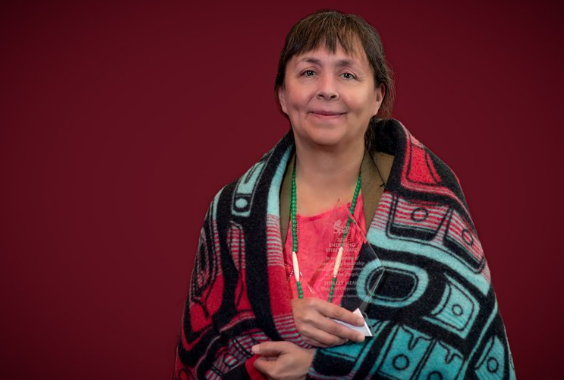
Enduring Spirit Honorees 2022
2022 Honorees
Congratulations to our 2022 Enduring Spirit Award honorees Susan Balbas (Cherokee/Yaqui), Shelley Means (White Earth Chippewa/Sioux), Shana Brown (Yakama/Muckleshoot/Puyallup), and Dr. Carol Minugh (Gros Ventre)
Susan Balbas | Cherokee/Yaqui
Co-founder and Executive Director, community organizer, Susan holds a Bachelor of Business Administration and a Master of Science in Teaching. Ms. Balbas carries valuable expertise in all levels of nonprofit operations and management. She was a national training and technical assistance specialist for multiple tribal youth programs for the U.S. Department of Justice’s Tribal Youth Programs through Education Development Center. Susan has been an independent consultant working with tribes, artists and nonprofit organizations, the Chief Development Officer at United Indians of All Tribes Foundation in Seattle, Development and Donor Education Coordinator at Changemakers Foundation in San Francisco, Executive Director at the NAYA Youth and Family Center in Portland, Outreach Director at the Western Water Alliance in Seattle where she was the primary researcher on water and related environmental issues.
Mother of three and grandmother of three, Susan has studied extensively with herbalists, is an avid gardener, cook, and a voracious reader of historical novels. She currently serves on the boards of Front & Centered, Washington Progress Alliance and the Potlatch Fund in Seattle.
Shelley Means | White Earth Chippewa/Sioux
A mother and indigenous-community consultant, facilitator and volunteer who lives with her family in the traditional territories of the S’Homamish (Puyallup) people, in Washington State. She has a BA from the University of Oregon Journalism School (1986). Currently serves as Chief Culture Officer at Seattle Indian Health Board, after more than 4 years on the Board of Directors. She also serves as Co-Coordinator of the Native American Women’s Dialog on Infant Mortality (NAWDIM); Talking Circle Facilitator for NAWDIM’s cradleboard classes; serves as advisor to Native Voices Rising, a pooled fund for grassroots social change organizations (Native Americans in Philanthropy and Common Counsel Foundation); and from 2016 to December 2021, worked with Native Organizers Alliance as a trainer and special projects coordinator.
Social and racial justice have always been central to Shelley’s work. Past organizing experience includes the Snoqualmie Falls Preservation Project, Community Coalition for Environmental Justice, and the Coalition to End Urban Indigenous Homelessness. Research experience includes project support for the 2020 Indigenous Futures Survey, and a NAWDIM project to survey 29 tribes and urban Indian communities on maternal and child health (funded by WA March of Dimes).
Shana Brown | Yakama/Muckleshoot/Puyallup
Shana Brown is a veteran classroom teacher, speaker, trainer, author, and curriculum designer. Brown is the daughter of Dennis “Buster” Windsor and the late Muriel Craig and the granddaughter of the late Blanche Hoptowit Craig and John R. Craig, Sr. Her experiences growing up on the Yakama reservation shaped not only her career, but her commitment to teaching the truth about how this country came to be.
A wife and mother of two, Brown first became involved formally in Indian education by co-writing Washington State’s now retired social studies grade level expectations (GLEs). Others took notice of her work, which opened the door to further shaping the way American Indian history is taught in Washington’s schools.
Brown was tapped to author curriculum for the Washington State Historical Society, leading to co-authorship of Since Time Immemorial: Tribal Sovereignty in Washington State, required curriculum for all Washington state public school students since 2015. She has trained thousands of teachers throughout the Northwest, and her many curriculum projects include the Regional Learning Project’s Tribal Perspectives of American History in the Northwest, Honoring Tribal Legacies for the National Park Service’s Lewis and Clark National Historic Trail, and Why Do the Foods We Eat Matter? and The Fish Wars, the two Pacific Northwest teaching modules for Native Knowledge 360°, an online initiative for the Smithsonian’s National Museum of the American Indian.
Brown’s several honors include being recognized as a US Department of Education “Great Educator” by President Obama in 2016, as a featured presenter for the 2020 OC for the Social Studies Project (Let American Indians Evolve) and gave the keynote address for Seattle Pacific University’s School of Education Commencement in 2021.
After 30 years of teaching in public schools, Shana is currently the Native American Curriculum Specialist for Seattle Public Schools. Autumn 2022, she will begin her Ph.D. in teaching, learning, and curriculum at the University of Washington.
Dr. Carol Minugh | Gros Ventre
Born Carol Julia Minugh Nov 6th 1934 at the Fort Belknap Agency Hospital North Eastern Montana. Carol is the 9th of 10 children to Celia (O'bryan) and Alfred Minugh both Gros Ventre citizens. Carol grew up around an active ranch and farm community and later moved to Hoquiam as a junior in high school where at 17 she married and had 4 children.
Her work at various cafes including the Oriole in Hoquiam, practicing real estate or advising the youth and young adults at her church gave her many opportunities to respond to the needs of people that she encountered.
In 1971 she started college at Grays Harbor and after completing her Bachelors of Liberal Arts at The Evergreen State College she went on to WSU for her masters degree in Education Administration. As a Rockefeller Fellow she was an assistant to the president at Central Arizona Community College, working with the native communities there. Carol began her doctorate program in Tucson at the University of Arizona, and went on to receive it from Penn State University in 1982.
Carol was hired for the National Center for Research at The Ohio State University, working with Native peoples around the United States. Carol was later a research specialist in Washington State, before working for United Indians in Seattle providing education assistance for tribes in Washington, Oregon, Idaho and Alaska.
Carol worked as faculty at The Evergreen State College teaching and developing educational programs for over 20 years. She created the reservation based bachelor's degree program, currently called Pathways, as well as the Gateways for incarcerated youth program. Many of her former students from both of these programs stay connected with Carol to this day as a friend, mentor and advisor.
In the last 2 years Carol was hired to work with a community based program out of Washington DC consulting local programs in participatory research.





